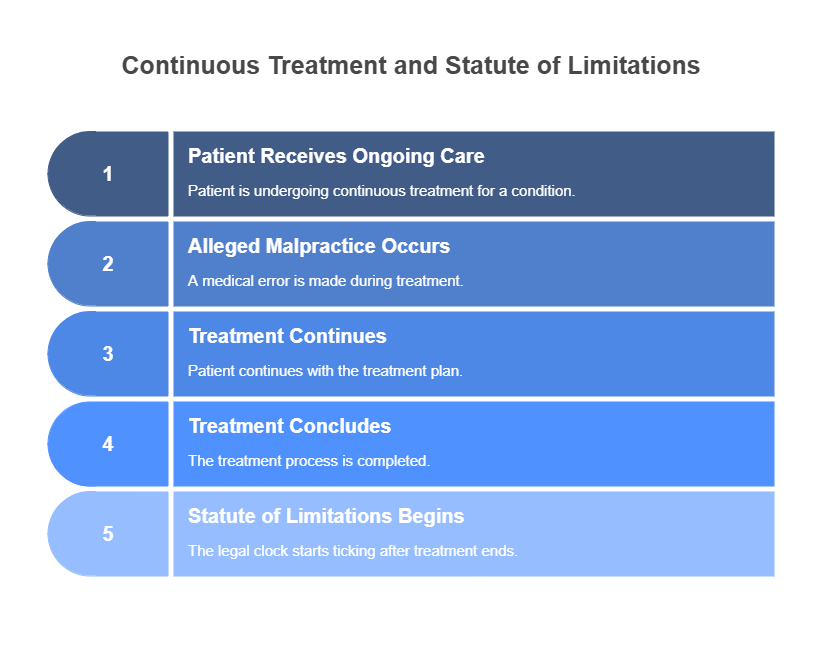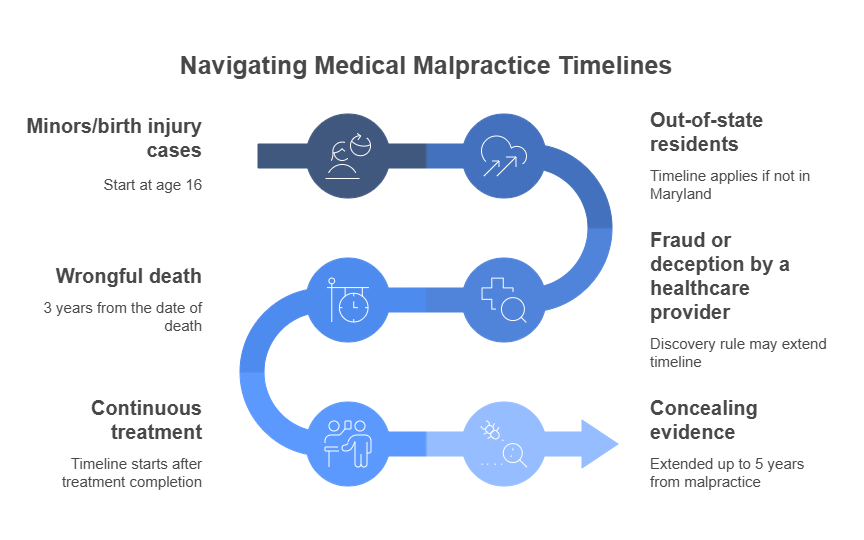
The Maryland medical malpractice statute of limitations is either five years from the date of the alleged malpractice or three years from when the injury was discovered, whichever comes first.
However, exceptions to this rule do exist:
- Minors/birth injury cases: The timeframe doesn’t start until the minor becomes 16.
- Out-of-state residents: The timeline applies only if the individual is not in Maryland at the time of the injury.
- Fraud or deception by a healthcare provider: The discovery rule may apply and extend the statute of limitations.
- Wrongful death: 3 years from the date of death, and not the date of the alleged negligence.
- Continuous treatment: The statute of limitations may not begin until the completion of the treatment.
- Concealing evidence: The statute of limitations may also be extended for up to five years from the date of the alleged malpractice
This means that victims must initiate legal action within this timeframe to have their case considered in court.
Need help understanding the statute of limitations on medical malpractice?
If you find yourself confused with medical malpractice claims and are uncertain about the statute of limitations that applies to your situation, it is essential to seek professional guidance.
At Frank Spector Law, our experienced team of Baltimore medical malpractice attorneys is dedicated to helping victims understand their rights and the legal options available to them.
We offer free personalized consultations to assess your case and provide you with the expert advice needed to take appropriate action within the necessary timeframe.
Don’t let the statute of limitations hinder your pursuit of justice — find out how we can help you in seeking the compensation you deserve!
What is the statute of limitations for medical malpractice?
The statute of limitations for medical malpractice refers to the legally defined period within which a patient must file a lawsuit following an incident of alleged negligence by a healthcare provider. This timeframe varies by jurisdiction and serves to protect both the interests of victims and the defendants, ensuring timely justice.
Missing the deadline for filing a medical malpractice lawsuit can have severe consequences, as the court may refuse to hear the case. This can be a significant loss for a victim who has already suffered physical, emotional, and financial harm due to medical malpractice.
How the discovery rule impacts the timeframe
The discovery rule is a critical aspect of the statute of limitations in medical malpractice cases in Maryland.
This rule allows the statute of limitations clock to begin ticking not at the moment of the alleged negligence, but from the date of the discovery of the injury, or when the injured party should have discovered the personal injury and its cause.
It’s not uncommon for victims of medical malpractice to only discover the harm they have suffered months or even years after the date of the injury. This makes the discovery rule important in ensuring that victims have the opportunity to seek justice and receive fair compensation for their injuries.
However, the timeframe reduces from five to three if the discovery rule comes into play.
For example, if a patient undergoes surgery and experiences complications that are not immediately apparent, the three-year statute of limitations may not start until they discover the harm caused by the surgical error.
This acknowledges the complexities of hidden injuries and allows victims to seek justice without being too constrained by a legal timeline.
| Claim Type | Time Limit | Discovery Rule? | Special Notes |
|---|---|---|---|
| General Medical Malpractice | 3 years from discovery OR 5 years max | ✅ Yes | Discovery rule shortens the outer window |
| Minors (Age < 11) | Begins at age 11 | ✅ Yes | Earlier if involving foreign object or reproductive harm |
| Birth Injury (Age < 16) | Up to 5 years after turning 16 | ✅ Yes | Longer window to account for delayed symptoms |
| Wrongful Death | 3 years from the date of death | ❌ No | Applies even if malpractice occurred years prior |
| Fraud / Concealment | 3 years from discovery, up to 5 years | ✅ Yes | Must prove provider intentionally hid the error |
| Continuous Treatment | Begins at conclusion of treatment | ✅ Yes | Injury must be related to same course of care |
| Foreign Object Left in Body | 3 years from discovery, up to 5 years | ✅ Yes | Often discovered only during later procedures |
| Out-of-State Victims | Same as general rule | ✅ Yes | Applies only if injury occurred while not residing in Maryland |
| Statute of Repose (Absolute Cap) | 5 years from date of negligence | ❌ No | Applies regardless of injury discovery |
Additional reading: statute of limitations for medical negligence
Statute of Repose in Maryland Medical Malpractice Cases
Maryland enforces an absolute time limit known as the statute of repose for medical malpractice cases. This law states that no malpractice claim may be filed more than five years after the date of the alleged negligence, regardless of when the injury was discovered. This rule overrides the discovery exception if too much time has passed.
For example, if a surgical error occurred in 2018 but wasn’t discovered until 2024, a lawsuit would likely be barred—even if the harm was only recently identified.
This rule is codified under Md. Code, Courts & Judicial Proceedings § 5–109.
📌 Key takeaway: Even if you discover your injury late, the five-year cutoff may prevent your case from moving forward.
Medical malpractice statute of limitations exceptions
In addition to the discovery rule, there are other notable exceptions to the statute of limitations for medical malpractice in Maryland.
The following are some common exceptions to the statute of limitations for medical malpractice in Maryland, including cases involving medical error.
Minors/birth injury cases
The standard statute of limitations in Maryland for medical malpractice doesn’t start until the minor becomes 16, and then the usual timeframe of five years applies, or three years for when the discovery occurs.
This extension acknowledges that minors often cannot advocate for themselves and provides additional time for families to seek justice for their child’s injuries.
However, if the claimant was under 11 years old at the time the injury was committed, the standard time limitations will start when the claimant reaches the age of 11 years. Exceptions to this are if the injuries were:
- To the reproductive system, or
- Caused by a foreign object left in their body
Out-of-state residents
In cases where the injured party is an out-of-state resident, the statute of limitations remains five years from the date of the alleged negligence. However, the timeline applies only if the individual is not in Maryland at the time of the injury.
The discovery rule applies the same here, and the timeframe for Maryland medical malpractice claims reduces to three years in this instance.
Fraud or deception by healthcare provider
If a healthcare provider intentionally conceals an injury or illness caused by their negligence, the discovery rule may apply and extend the statute of limitations. This exception acknowledges that victims should not be barred from seeking justice due to dishonesty and deceit by those responsible for their care, especially in cases of medical error.
For example, if a doctor fails to disclose an error or misdiagnoses a patient, and the true cause of the harm is later revealed, the statute of limitations may begin from the date of discovery rather than the date of the initial medical treatment.
Wrongful death
As per MD. Courts and Judicial Proceedings Code § 3-904, the statute of limitations for a wrongful death claim is 3 years from the date of death, and not the date of the alleged negligence.
This allows family members of deceased victims to seek justice and compensation on their loved one’s behalf, even if they were not aware of the negligent act at the time it occurred.
For instance, if a patient tragically dies due to a medical malpractice that happened two years ago (but was only discovered recently), their family may have 3 years from the date of death to file a wrongful death claim rather than the standard 3-year timeline for medical malpractice claims.
A note on continuous treatment
In instances of continuous treatment, where a patient is receiving ongoing care for the same condition related to the alleged malpractice, the statute of limitations may not begin until the completion of the treatment. This provision ensures that patients are not penalized for extending care that could mask the malpractice.
For example, if a patient is undergoing chemotherapy for cancer, and the medical provider commits an error that causes harm, the statute of limitations may not begin until the conclusion of the chemotherapy treatment. This ensures that patients can focus on their health without worrying about legal deadlines.

Concealing evidence
If the healthcare provider has concealed evidence of negligence, the statute of limitations may also be extended for up to five years from the date of the alleged malpractice. This exception acknowledges the importance of evidence in proving a medical malpractice claim and prevents negligent providers from hiding their mistakes to avoid liability.
That said, an attorney must provide clear and convincing evidence of the healthcare provider’s intent to conceal evidence to invoke this exception successfully. This involves showing reasonable grounds to believe that the provider destroyed, concealed, or tampered with evidence related to the alleged malpractice.
For further guidance on how the above exceptions might apply to you, contact a D.C. medical malpractice lawyer today.
Free Case Assessment & Consultation
Get the Justice You Deserve
Maryland medical malpractice laws that may affect your claim
Besides the statute of limitations and its exceptions, various other legal considerations could impact a personal injury claim. Specific medical malpractice laws in Maryland may affect the amount of compensation you can receive or your ability to file a lawsuit.
Affidavit of Merit
In Maryland, claimants are required to file an affidavit of merit along with their medical malpractice lawsuit, which confirms that the plaintiff has consulted with a medical professional and that the expert believes there is a legitimate basis for the claim according to Maryland courts and judicial proceedings.
This requirement is designed to prevent frivolous lawsuits and ensure that only cases with valid medical opinions proceed in court within the applicable statute of limitations.
Cap on Damages
Maryland law imposes a cap on non-economic damages in medical malpractice cases, which includes compensation for pain and suffering, emotional distress, and loss of companionship. This cap is adjusted periodically for inflation, making it essential for plaintiffs to be aware of the current limits when calculating potential awards:
- For actions arising between January 1, 2005, and December 31, 2008, the cap on noneconomic damages is $650,000.
- This limit increases by $15,000 annually starting January 1, 2009, affecting the compensation available for medical bills.
- The limitation applies to all claims from the same medical injury, regardless of the number of plaintiffs or defendants.
- In wrongful death cases with multiple claimants, the total noneconomic damages may not exceed 125% of the established limit.
Additional reading: Maryland cap on non-economic damages
Comparative Negligence
Maryland follows a contributory negligence standard, meaning if the injured party is found to have contributed to their injury in any way, they may be barred from recovering damages.
This strict standard underscores the importance of building a strong case to demonstrate the healthcare provider’s primary responsibility for the malpractice.
Maryland’s Health Care Arbitration Requirement
Before a medical malpractice case can proceed to court in Maryland, the law requires that the claim be filed with the Health Care Alternative Dispute Resolution Office (HCADRO), unless both parties agree to waive this step.
This initial filing must include the Certificate of Qualified Expert, which confirms that a licensed medical professional has reviewed the case and believes it has merit.
Arbitration is intended to reduce unnecessary court cases, but many plaintiffs choose to waive it so the case can proceed directly to litigation. Our attorney will help determine which approach is best for your situation.

Case examples for the medical malpractice statute of limitations in Maryland
In the case of Mee v. Peterson (2021), the Maryland Court of Appeals explored the implications of the statute of limitations in medical malpractice claims. This case arose when the plaintiff, Mee, alleged that the medical provider, Peterson, failed to diagnose a significant medical condition in a timely manner, leading to severe health complications.
Central to the dispute was when the statute of limitations began to run, which initially was set from the date of the alleged malpractice itself. However, the court considered the elements of continuous treatment and whether Mee was informed of the negligence during the ongoing care period.
In this instance, because the treatment continued beyond the initial error, the court ruled that the statute of limitations would not begin until the conclusion of the treatment.
The pivotal decision highlights the importance of protecting patients’ rights to seek justice for malpractice that may not have been immediately apparent, emphasizing that the discovery rule can extend limitations, allowing victims to pursue their claims when they become aware of the relevant facts.
The writ of certiorari played a role in this case as it allowed the higher court to review the lower court’s ruling, providing clarity on the application of the statute of limitations in Baltimore medical malpractice claims.
This decision serves as a significant reference point in Maryland law, highlighting the balance between ensuring timely claims and acknowledging the complexities of ongoing patient care.
Overall, this case reaffirmed that the statute of limitations must consider not only the actions of the healthcare provider but also the ongoing relationship and the patient’s ability to identify malpractice.
Additional reading: how long does a malpractice settlement take
How Frank Spector Law can help you
A medical malpractice claim in Maryland can be overwhelming, especially when dealing with the emotional and physical toll of negligent healthcare.
At Frank Spector Law, we are committed to providing you with the expert legal guidance you need to understand your rights and pursue the compensation you deserve within the applicable statute of limitations.
Our experienced medical malpractice lawyers will work closely with you, ensuring that all aspects of your case are thoroughly examined, and will guide you through the nuances of Maryland law, including the statute of limitations, affidavits of merit, and caps on damages.
If you believe you or a loved one has been a victim of medical malpractice, don’t hesitate to reach out.
Contact us today for a consultation, and let us help you seek justice and accountability from those responsible. Your health and peace of mind are our top priorities!
Stand Up for Your Rights
Take the first step toward justice with a free consultation directly with Frank Spector

Direct attorney contact
Decades of courtroom experience
Personal, judgment-free case reviews
Final points on the statute of limitations for medical malpractice in Maryland
The statute of limitations for medical malpractice in Maryland is a vital element in pursuing a successful claim. While there are exceptions to the limitations, familiarize yourself with the relevant laws and seek legal advice promptly if you believe you have been a victim of malpractice.
Remember, your health and well-being are important, and seeking justice is essential in addressing any instances of medical malpractice. With the support of an experienced attorney, you can work towards a resolution that provides closure and compensation for your suffering.
FAQs
Can you sue a doctor after 10 years?
Yes, you can sue a doctor after 10 years in Maryland if the medical malpractice case arises from an injury discovered. Claimants must file a claim within the three-year statute of limitations from the date of the injury being discovered.
Can you claim for medical negligence after 3 years?
Yes, you can claim for medical negligence after 3 years in Maryland only if the injury was not discovered within that timeframe. The discovery rule may allow for an extension, but claims must be filed within five years from the date of the malpractice incident.
Do most medical malpractice lawsuits settle?
Yes, the majority of malpractice claims settle out of court, often during pretrial negotiations. Trials are costly and time-consuming, and insurers prefer to limit risk.

